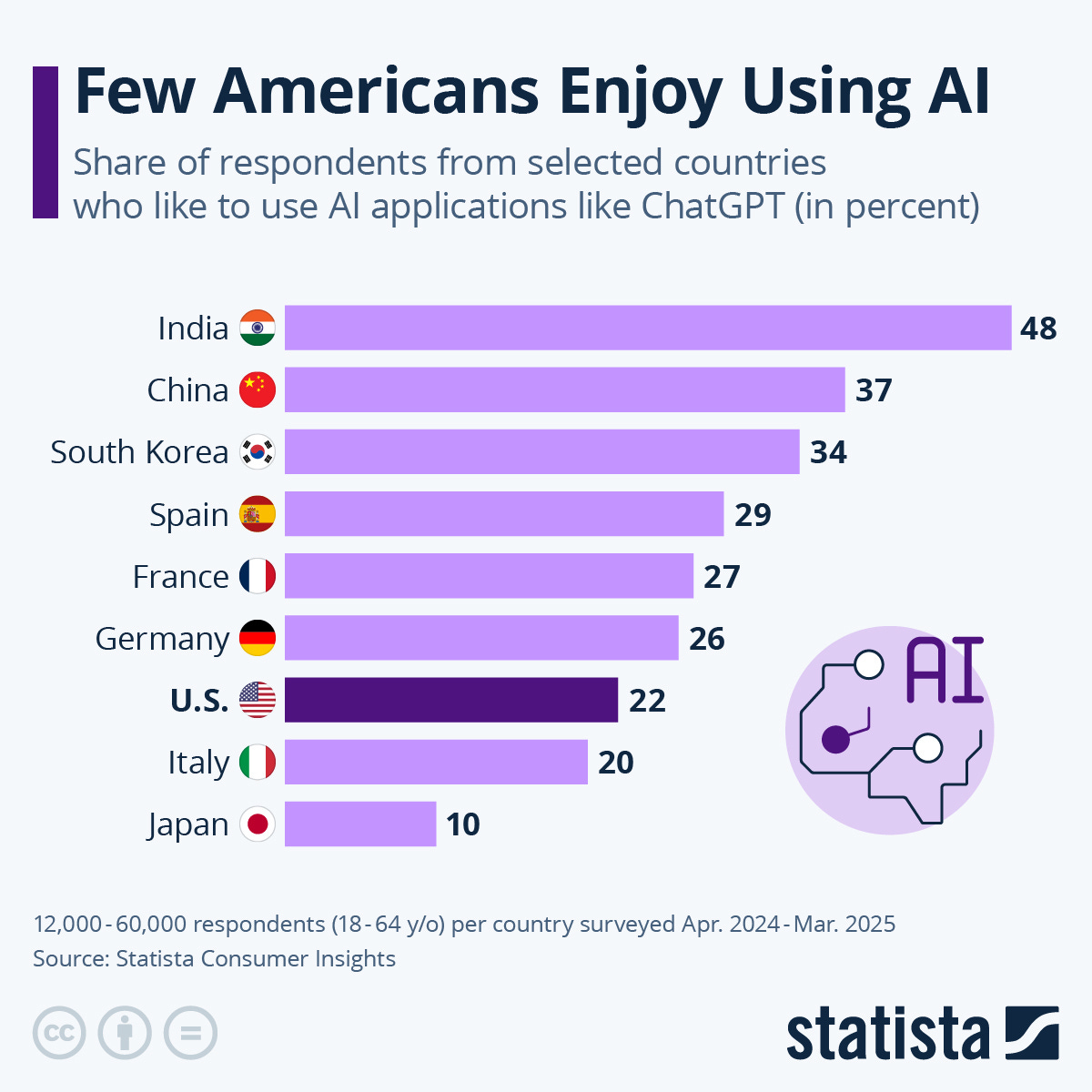This week…
Your reading time is about 5 minutes. Let’s start.
This week, I finally finished the longest read I’ve read this year. It’s not like the book was 1,000 pages long. This book was recommended to me by a friend who recently completed a PhD in masculinities studies. It took me a whole month to read this because I had to keep putting it down since I got too easily infuriated by men causing problems, then playing the victim, then blaming others, but never themselves, then causing more problems. It was really annoying. Occassionally, I felt a little bit sorry for some individuals in the book, who happened to be men, being harmed by men doing male things; but in general, I have no patience for men and their toxic masculinity. It ruins everyone and everything.
I am reading manga now for the next week.
Your Wikipedia this week: Algocracy
And now, a selection of top stories on my radar, a few personal recommendations, and the chart of the week.
ICYMI: The Previous Block was about the far-right and science (bad).
CORRECTION NOTICE: None notified.TECH / AI
Draining cities dry: the giant tech companies queueing up to build datacentres in drought-hit Latin America
Laís Martins and Francisco Amorim for The Guardian:
It is a warehouse the size of 12 football pitches that promises to create much-needed jobs and development in Caucaia city, north-east Brazil. But it won’t have shelves stocked with products. This vast building will be a datacentre, believed to be earmarked for TikTok, the Chinese-owned video-sharing app, as part of a 55bn reais (£7.3bn) project to expand its global datacentre infrastructure.
As the demand for supercomputer facilities rises, fuelled by the AI boom, Brazil is attracting more and more tech companies. The choice of Caucaia is no accident. Several undersea cables carry data from the nearby capital of Ceará state, Fortaleza, to other continents. The closer to the cables, the greater the traffic capacity and the lower the latency, or response time, between two points on the internet network.
Caucaia also has Pecém EPZ, a zone in which companies can produce goods and services for export with a range of tax benefits and simplified bureaucratic procedures.
Yet Caucaia also suffers from extreme weather events, including droughts and heavy rains, according to data from the Digital Atlas of Disasters in Brazil and the Integrated Disaster Information System.
In 16 of the 21 years between 2003 and 2024, a state of emergency due to drought was declared in the city at least once. In 2019, almost 10,000 people were affected by water shortages, the Digital Atlas of Disasters shows. As reservoirs were depleted, the water became unfit for consumption, leading to crop losses and difficulty accessing basic food for the population.
Datacentres use vast amounts of energy and water to cool their supercomputers. Nevertheless, public authorities are greenlighting their construction in cities that have persistently suffered from drought. Caucaia is not an isolated case.
Loosely linked:
Why AI advancement doesn’t have to come at the expense of marginalised workers by Michelle Kim for Rest of World.
Homegrown digital road maps turn into lifelines for West Bank’s Palestinians by Reem Abd Ulhamid for Rest of World.
AI, impunity, and ‘authoritarian media control’ in Southeast Asia by Mong Palatino for Global Voices.
Could AI help elderly people and refugees reconstruct unrecorded pasts? by Anna Pivovarchuk for Al Jazeera.
CYBERCRIME
Scam factories force trafficked workers to defraud global victims
Linda Yulisman for Rest of World:
Young Indonesians are increasingly falling for fraudulent job ads on Telegram, Facebook, and other social media and getting trafficked to scam farms in Southeast Asia, former scammers and cybersecurity experts told Rest of World. There, they learn to use AI-generated deepfakes, voice clones, large language models, and other technologies to con people into parting with their life savings.
“Thousands of jobs, usually IT-related ones, are circulated on social media, but they are fake,” Anis Hidayah, commissioner of the National Commission on Human Rights in Jakarta, told Rest of World. “They generally target those who already have passports. They are recruited very quickly without predeparture training. Later, they can be trained within only two days and start working.”
Many of the scammers are young men and women from Southeast Asia, China, Ethiopia, India, and other developing countries. Hundreds of thousands of them sign up for what they believe are staid office jobs doing digital marketing and online sales that they find on social media. But they are instead taken to fortified scam compounds along the border of Myanmar, Cambodia, and Laos and in the Philippines, run by Chinese criminal syndicates. These farms earn about $40 billion in profits every year. Americans alone lost $12.5 billion in 2024, mostly to investment scams, according to the U.S. Federal Trade Commission.
Loosely linked:
Cambodia is home to world’s most powerful criminal network ($) by Huw Watkin for SCMP.
Is Pakistan’s cybercrime law silencing dissent? by Haroon Janjua for DW.
Going, going, gone: Scam websites imitating famous brands are luring in victims on social media by Catie McLeod for The Guardian.
Russian-led cybercrime network dismantled in global operation by Lisa O’Carroll and Kate Connolly for The Guardian.
MANOSPHERE
From the Liver King to ultramarathons, fitness influencers are glorifying extreme masculinity where ‘pain is the point’
Samuel Cornell (UNSW Sydney) for The Conversation:
A new Netflix documentary about a shirtless supplement salesman who claimed to be “natural” and was exposed as a fraud might seem like a punchline.
But Untold: The Liver King is more than just a character study of a well-known fitness influencer; it’s a case study of performative masculinity in the world of social media.
Brian Johnson, better known as the Liver King, built a brand on extreme workouts, eating raw organ meat, and evangelising about masculinity. He preached “ancestral living” and radical self-control, all while secretly using steroids.
And his rapid rise to popularity reveals how social media rewards the spectacle of hypermasculinity – especially when it leans into extreme behaviours.
Extreme self-discipline, extreme exercise, extreme eating and extreme “wellness” have all become forms of public performance on social media.
From influencers pushing steroids or “wellness” lifestyles, to the growing popularity of ultramarathons, a new model of masculinity is going viral: control your body, grit through pain, workout hard, and make sure everyone hears about it.
Loosely linked:
Nick wanted to drop bodyfat and build his own micro-harem of women: how my friend fell for the red-pill hucksters of the manosphere by James Bloodworth for The Guardian.
The world’s largest incel forum reacts to Netflix’s Adolescence with hate and conspiracies by CCDH.
Manosphere’s reputation bump by Erica Pandey by Axios.
Other curious links, including en español et français

LONG READ | Meet the lawyer representing a player at the centre of the Hockey Canada trial by Katherine Laidlaw for Toronto Life.
INFOGRAPHIC | How traditional kitchen tools shape nourishment in Sri Lanka by Taahira Ayoob for Kontinentalist.
PHOTO ESSAY | The last nomads by Natela Grigalashvili for The Dial.
La ola ultra gana terreno en Europa por Raúl Sánchez, Icíar Gutiérrez, Víctor Honorato y María Ramírez en elDiario.es.
La tronista de la extrema derecha por Xosé Manuel Pereiro en CTXT.
El culto a la violencia por Agustín Basave en Proceso.
Un défouloir et une validation de ce que je pense : quand l'intelligence artificielle remplace les consultations chez le psy par Mathilde Goupil dans Franceinfo.
ChatGPT correcteur d’articles ? Les secrétaires de rédaction du groupe Ebra sont partagés par Xavier Eutrope dans La revue des médias.
L’IA en rando : utile, mais pas toujours par Sophie Chevance dans Radio-Canada.
What I read, listen, and watch
I’m reading The Man They Wanted Me to Be: Toxic Masculinity and a Crisis of Our Own Making (2019) by Jared Yates Sexton.
I’m listening to System Crash with Paris Marx and Brian Merchant about kids being done with the Internet (and the reason they’re over it want to make it worst). The headline is based on a survey by the BSI, which you can read here.
I’m watching an ARTE.tv documentary social media fraudsters.
Chart of the week
Katharina Buchholz reported on Statista’s consumer insights, which surveyed 12,000 to 60,000 respondents per country between April and May. Among selected countries, AI tools are least popular in Japan (10 per cent) followed by Italy (20 per cent), where ChatGPT was temporarily banned.





